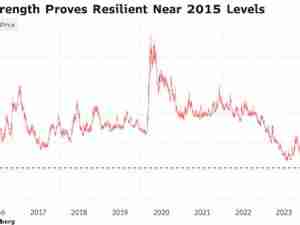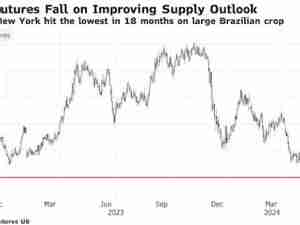Texas Instruments Inc. shares slumped after the chipmaker gave a weaker-than-expected forecast and warned that trade tension is making customers far more cautious. The report spurred a sell off in semiconductor stocks.
Investors have poured money into chip stocks this year, betting on a rebound in demand. That hasn’t happened as a U.S.-China trade war drags on, undermining economic growth. Texas Instruments, the first big semiconductor maker to report in this earnings cycle, has products in almost all markets that use electronic components, making its predictions a broad indicator.
The company said most of its markets deteriorated in the quarter, with automotive and communications-equipment demand among the weakest. Companies are cutting back on orders as they wait for China and the U.S. to reach a definitive trade agreement, Chief Financial Officer Rafael Lizardi said.
“Macro is weak because of trade tensions,” Lizardi added in an interview on Tuesday. “When that happens, companies pull back.”
Texas Instruments has more than 100,000 customers and a similar number of products, so a drop in orders signifies a weaker economy, not a loss of market share, the CFO also said.
Fourth-quarter earnings will be 91 cents a share to $1.09 a share on revenue of $3.07 billion to $3.33 billion, the Dallas-based company said in a statement. On average, analysts predicted profit of $1.28 a share and sales of $3.59 billion, according to data compiled by Bloomberg. At the mid-point, Texas Instruments’ projections represents a 14% decline in revenue from a year earlier.
The company had said sales declines this year were the result of torrid growth in 2018 when customers accumulated inventory they’re now working through. A normal pattern would result in five quarterly declines before the backlog is cleared. The quarterly results reported on Tuesday marked the fourth period of contraction, so Wall Street was looking for signs of improvement. That made the warning from Texas Instruments particularly disappointing.
“It’s more concerning for the global growth outlook going forward,” said Logan Purk, an analyst at Edward D. Jones & Co. “It’s not good for the rest of the semiconductor space or markets in general.”
Texas Instruments shares dropped 10% in extended trading on Tuesday, after closing at $128.57 in New York. The stock has gained 36% this year. The benchmark Philadelphia Stock Exchange Semiconductor Index has increased 39% in 2019.
The world’s sixth-largest chipmaker reported third-quarter net income fell to $1.43 billion, or $1.49 per share, from $1.57 billion, or $1.58 a share, in the same period a year earlier. Revenue dropped 11% to $3.77 billion. Analysts had estimated a profit of $1.42 a share on sales of $3.81 billion.
The company gets the biggest portions of its revenue from the industrial and automotive markets where its chips provide key basic functionality such as power regulation and the translation of real-word experiences like sound and pressure into electronic signals. It’s a major supplier of parts for communications equipment such as mobile phone network base stations. Demand for that kind of chip dropped 20%, the company said.








